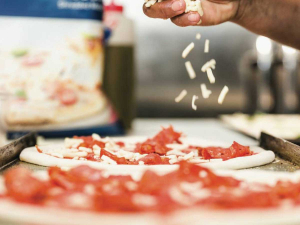Another Windfall for Fonterra Farmers, Unit Holders
Fonterra farmer shareholders and unit holders are in line for another payment in April.
 The main drivers of Fonterra’s performance was its ingredients business’s strong normalised gross profit and strong sales and gross margins from the Greater China foodservice business in the first half of the year.
The main drivers of Fonterra’s performance was its ingredients business’s strong normalised gross profit and strong sales and gross margins from the Greater China foodservice business in the first half of the year.
Fonterra shrugged off the effects of COVID-19 in many markets to record a $67 million rise in normalised earnings before income tax (EBIT).
The co-op’s total normalised EBIT for 2019-20 jumped from $812 million to $879 million.
Chief executive Miles Hurrell says the main drivers of the underlying business performance was a strong normalised gross profit in the ingredients business and, although there was the disruption from COVID-19, the strong sales and gross margins from the Greater China foodservice business in the first half of the year.
Ingredients’ normalised EBIT improved from $790 million last year to $827 million this year, with normalised gross profit up $165 million to $1.6 billion.
Hurrell says that at the co-op’s interim results, the normalised gross profit in ingredients was relatively steady.
“As we moved through the second half, we saw restaurants, cafes and bakeries close and intermittent spikes in supermarket sales, creating uncertainty across the global dairy market.
“This uncertainty resulted in softening milk prices, which helped improve the gross margin and gross profit in ingredients.”
Greater China foodservice’s normalised EBIT increased from $114 million last year to $169 million this year.
Hurrell says the business achieved strong year-on-year sales growth in the first half of the year but was then hit hard by COVID-19 when many food outlets were closed. Normalised gross profit started to quickly rebound in the third quarter – although he also points out it is still not at 100%.
“We have seen significant growth across the Anchor Food Professional product range in China.
“We have entered 50 new cities across China, taking our total to 350, and our products are now not only being used in Western-style restaurants and bakeries but also those serving local cuisine.
However, foodservice businesses across Asia, Oceania and Latin America were impacted by COVID-19 in the fourth quarter. All three markets reported losses in the second half.
Despite this, normalised EBIT for foodservice overall was up 14% on last year to $209 million, a result of the strong performance by the Greater China business in the first half.
The consumer business’ normalised EBIT reduced to $149 million from $227 million, mainly as a result of impairments of $57 million relating to the Chesdale brand and New Zealand consumer business’ goodwill.
Hurrell says its Australian consumer business performed strongly with sales continuing to increase thanks to its popular beverage, spreads and cheese products.
“Our New Zealand consumer business focused on improving customer service and keeping supermarket shelves well-stocked, particularly as New Zealanders were stockpiling through COVID-19.”
The Meat Industry Association of New Zealand (MIA) today announced that Chief Executive Officer Sirma Karapeeva has resigned from the role.
The winners of the 2026 Hawke’s Bay/Wairarapa Dairy Industry Awards were announced at the annual awards dinner held at Copthorne Solway Park in Masterton on Thursday evening.
Environment Southland is welcoming this week’s decision by the Environmental Protection Authority (EPA) to approve the release of Blaptea elguetai, a leaf‑feeding beetle that will help control the highly invasive Chilean flame creeper.
This March, the potato industry is proudly celebrating International Women’s Day on 8 March alongside the International Year of the Woman Farmer, recognising the vital role women play across every part of the sector — from paddocks and packhouses to research, leadership, and innovation.
Fruit trader Seeka posted a record profit and returns to shareholders in 2025.
Recent weather events in the Bay of Plenty, Gisborne/Tairawhiti, and Canterbury have been declared a medium-scale adverse event.
OPINION: Staying with politics, with less than nine months to go before the general elections, there’s confusion in the Labour…
OPINION: Winston Peters' tirade against the free trade deal stitched with India may not be all political posturing by the…